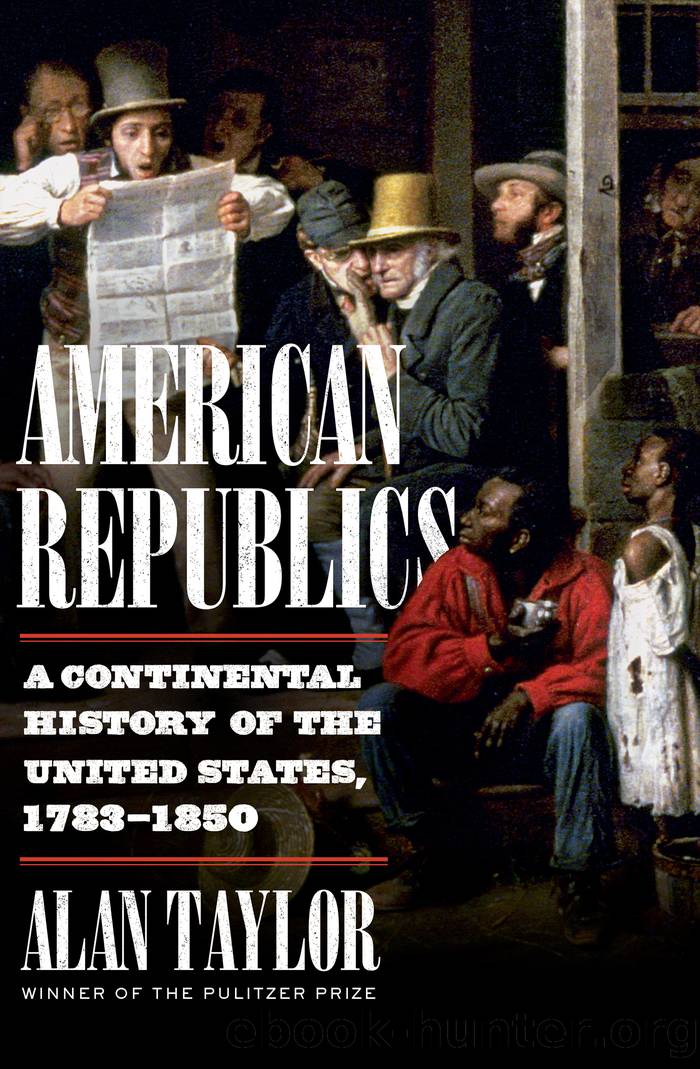American Republics by Alan Taylor

Author:Alan Taylor
Language: eng
Format: epub
Publisher: W. W. Norton & Company
Published: 2021-01-11T00:00:00+00:00
All I want in this creation
Is a pretty little wife and a big plantation
Away up yonder in the Cherokee nation
In a common swindle, a white man forged a promissory note made out to him and allegedly signed by an Indianâwho could not deny it in court. Then the forger would get a court order to take livestock, slaves, or land to satisfy the debt. The state had its own swindle: Georgia held a lottery and raffled off lands in the Cherokee Nation. In 1830, the discovery of gold in Cherokee country drew in a horde of intruders who brought slaves to work their mines. When Cherokees got in the way, the invaders beat them, burned their homes, and raped their women.91
Jackson won the presidency with almost unanimous support from the voters of Alabama, Georgia, and Mississippi. They expected him to remove their Indians, and Jackson made that cause the imperative priority of his administration. Publicly, Jackson told Indians to move beyond the Mississippi âor submit to the lawsâ of the southern states. Privately, he conceded âthat the Indians could not possibly live under the laws of the state.â Jacksonâs policy spread misery among Indians, but he concluded: âI feel conscious of having done my duty to my red children.â If they stayed and suffered, Jackson declared, âIt will be attributable to their want of duty to themselves, not to me.â92
Natives found champions among Protestant clergymen and laity from the Northeast. These friends organized protest meetings and petitions to Congress, and produced newspaper essays and pamphlets to defend aboriginal rights. The friends noted the inconsistency of uprooting people who had followed the governmentâs advice to embrace civilization. One petition denounced removal as âcruel, unjust, and disgraceful to our Government.â Another warned that forced removal would betray the nationâs founding ideals, and âthe only free gov[ernmen]t on earthâ would be âconverted into a Despotism of the most frightful character.â The petitioners included thousands of pious women. âWe are unwilling that the church, the schools, and the domestic altar should be thrown down before the avaricious god of power,â declared women from Maine.93
To counter moral criticism of removal, Jackson claimed that he would save the Indians by removing them to the West, where the federal government could âexercise a parental control over their interests and possibly perpetuate their race.â A few reformers supported his position. They included the superintendent of Indian affairs, Thomas McKenney, and a Baptist preacher, Isaac McCoy, who insisted that Natives faced extermination unless removed far beyond settlers and their alcohol. These reformers claimed that only a few mixed-blood chiefs opposed removal while the silent majority of Indians longed to escape misery by heading west.94
Southerners wanted to oust Indians without dithering about morality. Georgia governor Wilson Lumpkin derided the opponents as âNorthern fanatics, male and female . . . protesting against the removal of the poor, dear Indians.â Southerners accused northern opponents of seeking to enhance their regionâs relative power by blocking southern development. The removers also charged Yankees with hypocrisy, for their ancestors had driven out or killed most of New Englandâs Indians.
Download
This site does not store any files on its server. We only index and link to content provided by other sites. Please contact the content providers to delete copyright contents if any and email us, we'll remove relevant links or contents immediately.
| Africa | Americas |
| Arctic & Antarctica | Asia |
| Australia & Oceania | Europe |
| Middle East | Russia |
| United States | World |
| Ancient Civilizations | Military |
| Historical Study & Educational Resources |
The Dawn of Everything by David Graeber & David Wengrow(1694)
The Bomber Mafia by Malcolm Gladwell(1620)
Facing the Mountain by Daniel James Brown(1546)
Submerged Prehistory by Benjamin Jonathan; & Clive Bonsall & Catriona Pickard & Anders Fischer(1452)
Wandering in Strange Lands by Morgan Jerkins(1419)
Tip Top by Bill James(1409)
Driving While Brown: Sheriff Joe Arpaio Versus the Latino Resistance by Terry Greene Sterling & Jude Joffe-Block(1370)
Red Roulette : An Insider's Story of Wealth, Power, Corruption, and Vengeance in Today's China (9781982156176) by Shum Desmond(1352)
Evil Geniuses: The Unmaking of America: A Recent History by Kurt Andersen(1346)
The Way of Fire and Ice: The Living Tradition of Norse Paganism by Ryan Smith(1329)
American Kompromat by Craig Unger(1307)
It Was All a Lie by Stuart Stevens;(1296)
F*cking History by The Captain(1292)
American Dreams by Unknown(1277)
Treasure Islands: Tax Havens and the Men who Stole the World by Nicholas Shaxson(1267)
Evil Geniuses by Kurt Andersen(1249)
White House Inc. by Dan Alexander(1207)
The First Conspiracy by Brad Meltzer & Josh Mensch(1167)
The Fifteen Biggest Lies about the Economy: And Everything Else the Right Doesn't Want You to Know about Taxes, Jobs, and Corporate America by Joshua Holland(1116)
